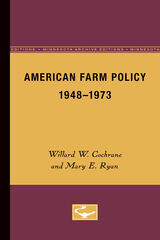
The City Man's Guide to the Farm Problem was first published in 1965. Minnesota Archive Editions uses digital technology to make long-unavailable books once again accessible, and are published unaltered from the original University of Minnesota Press editions.
Few domestic questions are so controversial as the farm problem, yet the average city man finds it difficult to understand the basic issues involved. In this book Professor Cochrane describes for the layman the nature and causes of the commercial farm problem and the rural poverty problem and provides the basis for making informed judgments about these problems and their possible solutions. He analyzes the economic and political forces which are at work in the farm economy, explains the organization of modern agriculture, showing the unique structure of farming, and draws a vivid picture of the revolutionary developments which have taken place in agriculture. He discusses behavior patterns of farmers and consumers as they relate to the farm economy, and the role of government in the farm industry and in the lives of farmers.
The analysis and discussion make clear the reasons why the government is so deeply involved in farm issues and point up what will be needed in order to make some headway toward solutions of the problems. Professor Cochrane emphasizes that there is no perfect solution to the farm problem but he provides the information and analyses from which the reader can gain a better understanding of the issues.
Sixteen photographic illustrations show old and new methods of farming and types of equipment. There are also a number of charts, graphs, and tables.
Willard W. Cochrane is dean of international programs and a professor of agricultural economics at the University of Minnesota. He was director of agricultural economics in the U.S. Department of Agriculture and economic adviser to the Secretary of Agriculture from 1961 to 1964, and served as agricultural adviser to John F. Kennedy during the 1960 presidential campaign. He is the author also of Farm Prices: Myth and Reality.


Farm Prices was first published in 1958. Minnesota Archive Editions uses digital technology to make long-unavailable books once again accessible, and are published unaltered from the original University of Minnesota Press editions.
Few domestic questions are so controversial as the farm problem, yet the average city man finds it difficult to understand the basic issues involved. In this book Professor Cochrane describes for the layman the nature and causes of the commercial farm problem and the rural poverty problem and provides the basis for making informed judgments about these problems and their possible solutions. He analyzes the economic and political forces which are at work in the farm economy, explains the organization of modern agriculture, showing the unique structure of farming, and draws a vivid picture of the revolutionary developments which have taken place in agriculture. He discusses behavior patterns of farmers and consumers as they relate to the farm economy, and the role of government in the farm industry and in the lives of farmers.
Farm prices are constantly fluctuating, and out of this price variability emerge such serious and continuing farm problems as variable incomes, low incomes over extended periods, and uncertainty in production planning. In this study Professor Cochrane seeks to get at the root of the trouble by, first, exploring and exposing what he considers a basic fallacy in our present day thinking and approach to the farm problem. This is the widely held myth of an automatically adjusting agriculture, an agriculture that is always out of balance because of an "emergency." This myth, he points out, beclouds the issues involved in the whole farm problem.
The farm price myth splits two ways in the public mind, Mr. Cochrane explains, but these divergent attitudes represent differences only in mechanics, not in principle, and they are equally effective in obscuring the real picture. One segment of the public believes that agriculture, if left alone for a while, would gravitate toward and stabilize at some desirable level and pattern of prices, production, and incomes. The other segment believes that the same result would occur if agriculture were given a temporary, helping hand by the government. Mr. Cochrane shows the fallacies inherent in both of these convictions by presenting an integrated, overall picture of farm price behavior as it really exists. On a basis of this realistic view, he presents the two alternatives or hard policy choices that he believes the American farmer faces today.
Willard W. Cochrane is Professor Emeritus of Agricultural and Applied Economics at the University of Minnesota. He is the author of a number of books, including The City Man's Guide to the Farm Problem and Farm Prices: Myth and Reality. He previously served as an economist with the Food and Agriculture Organization of the United Nations and with the U.S. Department of Agriculture. He is the co-author of Economics of American Agriculture and Economics of Consumption.
READERS
Browse our collection.
PUBLISHERS
See BiblioVault's publisher services.
STUDENT SERVICES
Files for college accessibility offices.
UChicago Accessibility Resources
home | accessibility | search | about | contact us
BiblioVault ® 2001 - 2024
The University of Chicago Press









